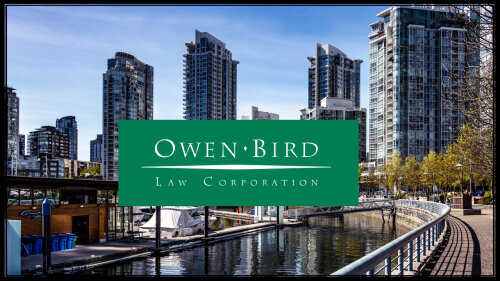Best Wrongful Termination Lawyers in Vancouver
Share your needs with us, get contacted by law firms.
Free. Takes 2 min.
List of the best lawyers in Vancouver, Canada
About Wrongful Termination Law in Vancouver, Canada
Wrongful termination, also known as wrongful dismissal, revolves around an employer terminating an employee's contract of employment in a manner that breaches either one or more terms of the contract of employment, or a statute provision in employment law. In Vancouver, a dismissal may be considered 'wrongful' if it is done in a discriminatory manner, without proper notice, without just cause, or in retaliation for the employee pursuing their legal rights, among other reasons.
Why You May Need a Lawyer
There are several reasons why you may need a lawyer when dealing with wrongful termination issues. This includes situations where you have been fired without just cause or notice, your employer fails to provide with severance pay, you were dismissed for discriminatory reasons, or your employer created a hostile work environment forcing you to quit. In such situations, a lawyer can help interpret the law, build a solid case to protect your rights, and negotiate settlements or represent you in court.
Local Laws Overview
In Vancouver, key aspects of local laws related to wrongful termination include the Employment Standards Act (ESA) and the British Columbia Human Rights Code. The ESA sets out the minimum standards that apply in most workplaces in British Columbia and includes provisions related to termination notice and pay. The Human Rights Code prohibits dismissal on grounds of factors like race, religion, sexual orientation, age, among others. Note that these laws only set the minimum standards, and your contract of employment may provide greater rights.
Frequently Asked Questions
What compensations can I get for a wrongful dismissal?
The compensations you may receive include pay in lieu of notice, severance pay, or damages for breach of contract. The amount depends on various factors like length of service, nature of your job, etc.
Can I sue my employer for stress or bad treatment?
In some cases, you may be able to sue your employer for constructive dismissal, which happens when the employer's conduct makes it impossible for you to continue working.
How long do I have to file a wrongful termination claim?
The time limit depends on the law under which you are filing the claim. Under the ESA, you generally have six months to file a complaint whereas civil claims generally have a two-year limitation period.
What constitutes as wrongful termination?
Wrongful termination occurs when an employer violates specific terms of the employment contract or employment standards regulations when dismissing an employee. This can include dismissing an employee without cause without providing appropriate notice or severance pay, or dismissing an employee due to discriminatory reasons.
Can I be terminated while on maternity or parental leave?
No, in Vancouver, it is illegal to terminate an employee while they are on maternity or parental leave, unless the employer can show a justifiable reason unrelated to the leave.
Additional Resources
You may find it useful to consult the Employment Standards Branch of British Columbia's Ministry of Labour, or the British Columbia Human Rights Tribunal. These organizations can provide further guidance and support on wrongful termination issues.
Next Steps
If you believe you have been wrongfully terminated, the first step is to consult with a legal expert specializing in employment law. They can help to evaluate your claim, decide on the best course of action, and represent you in negotiations or lawsuits. Make sure to keep a copy of all relevant documents for your case, such as employment contracts and correspondence with your employer.
Lawzana helps you find the best lawyers and law firms in Vancouver through a curated and pre-screened list of qualified legal professionals. Our platform offers rankings and detailed profiles of attorneys and law firms, allowing you to compare based on practice areas, including Wrongful Termination, experience, and client feedback.
Each profile includes a description of the firm's areas of practice, client reviews, team members and partners, year of establishment, spoken languages, office locations, contact information, social media presence, and any published articles or resources. Most firms on our platform speak English and are experienced in both local and international legal matters.
Get a quote from top-rated law firms in Vancouver, Canada — quickly, securely, and without unnecessary hassle.
Disclaimer:
The information provided on this page is for general informational purposes only and does not constitute legal advice. While we strive to ensure the accuracy and relevance of the content, legal information may change over time, and interpretations of the law can vary. You should always consult with a qualified legal professional for advice specific to your situation.
We disclaim all liability for actions taken or not taken based on the content of this page. If you believe any information is incorrect or outdated, please contact us, and we will review and update it where appropriate.












